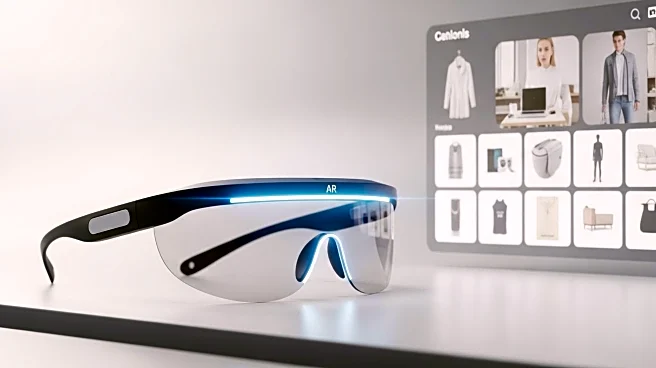What is the story about?
What's Happening?
Amazon is reportedly developing consumer augmented reality (AR) glasses, internally codenamed 'Jayhawk'. These glasses are expected to feature a camera, microphone, speakers, and a single-eye full-color display. This development marks a significant move by Amazon to integrate shopping and voice assistant functionalities into wearable technology. The announcement comes amidst a surge of AR product reveals from major companies, including Meta and Snap, indicating a broader push towards consumer AR adoption. Meta recently showcased its Ray-Ban Display Glasses, aiming to transition AR from prototypes to everyday use, while Snap plans to launch its next-gen Specs in 2026, focusing on social overlays.
Why It's Important?
The development of AR glasses by Amazon represents a potential shift in consumer technology, as it integrates retail and assistant features directly into eyewear. This move could redefine shopping experiences, allowing users to access maps and voice assistants seamlessly through their glasses. The competition among tech giants like Meta, Amazon, and Snap to dominate the AR market could accelerate innovation and adoption rates, impacting how consumers interact with technology daily. The integration of AR into consumer products may also influence privacy concerns, as these devices could collect and process personal data in new ways.
What's Next?
As Amazon and other companies continue to develop AR technology, consumers can expect quicker product cycles and more experiments in social and retail applications. The competition among major tech firms may lead to faster software ecosystem development, focusing on app stores, developer tools, and AR content formats. This could result in more robust and user-friendly AR experiences. Consumers should prepare by understanding device permissions and considering platform lock-in, as these factors will play a crucial role in data privacy and ecosystem choice.
Beyond the Headlines
The integration of AR into consumer technology raises ethical and privacy concerns, as these devices have the potential to collect and analyze vast amounts of personal data. The competition among tech giants may lead to increased scrutiny over data handling practices and the need for transparent privacy policies. Additionally, the shift towards AR could influence cultural norms, as wearable technology becomes more prevalent in everyday life, potentially changing how people interact with digital content and each other.
















